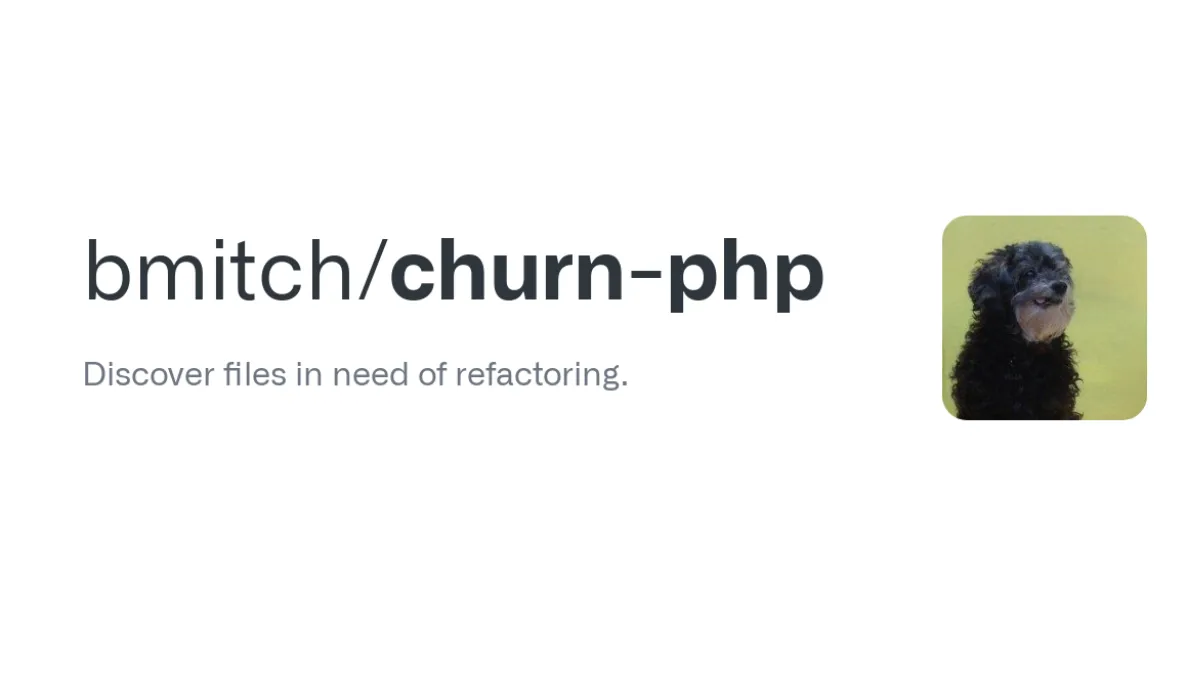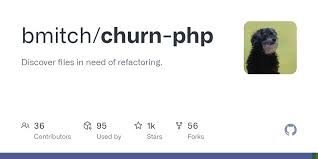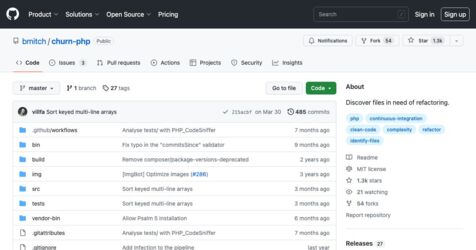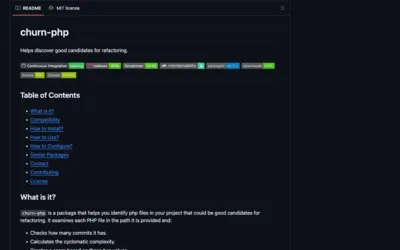
Table of contents
Introduction - Churn PHP
Churn PHP is a powerful static code analysis tool that helps PHP developers identify potentially risky areas of code. It combines complexity analysis with the churn rate of the code to uncover areas that are frequently changed and complex at the same time. This is particularly important when refactoring and optimising legacy code. Our agency uses Churn PHP in numerous projects and integrates it into GitLab CI/CD pipelines to ensure continuous monitoring and improvement of code quality.
Installation and setup of Churn PHP
The installation of Churn PHP is quick and easy via Composer:
1. install Churn PHP via Composer:
composer require --dev bmitch/churn-php
2. run the tool in your project directory to create a churn analysis:
vendor/bin/churn run src
Churn PHP analyses the change rate and complexity of the code and creates a report on potentially high-risk files.
Possible stumbling blocks:
- Make sure your version control is set up properly, as Churn PHP gets the change rates from the version control system (e.g. Git).
Configuration and customisation of Churn PHP
Churn PHP can be easily customised to analyse only specific directories or file types. You can also optimise the settings to set specific thresholds for complexity and churn rate.
Configuration example:
vendor/bin/churn run src --files-per-iteration=10 --min-complexity=10
Best practices:
- Ensure that only relevant files are analysed to ensure efficient analysis.
- Set thresholds for complexity and churn rate to specifically identify problematic code areas.
Advantages: With these adjustments, you can focus the analysis and limit the results to the most relevant code areas.
Use of Churn PHP
Churn PHP is particularly useful for identifying areas of code that are not only complex but also frequently changed. This combination indicates potentially error-prone and high-maintenance code areas that should be prioritised for refactoring or optimisation.
Typical use cases:
- Refactoring legacy code: Churn PHP identifies heavily used and simultaneously complex parts of the code that require special attention.
- Continuous code quality check: In new and existing projects, Churn PHP helps to identify and optimise high-risk code sections at an early stage.
Example of execution:
vendor/bin/churn run src --format=html > churn-report.html
This version provides you with an HTML report that lists the most risky files in your project.
Integration in CI/CD-Pipelines
Our agency successfully integrates Churn PHP into GitLab CI/CD pipelines to ensure that churn and complexity analysis is performed on every commit and merge.
Example of a GitLab CI configuration:
churn_analysis:
stage: test
script:
- vendor/bin/churn run src --format=json > churn-report.json
artifacts:
paths:
- churn-report.json
only:
- merge_requests
Advantages of integration:
- Automated checking of code complexity and change rate with every commit.
- Early detection of risky code sections before they lead to major problems.

Reach our PHP Consultant specialists
We are experts in PHP and help you to master your digital challenges. Our experienced team supports you with PHP updates, PHP refactoring and advises you remotely on all questions relating to PHP. With our fully automated CI/CD deployments and a robust Docker infrastructure, we take your PHP projects to the next level. Rely on our expertise for reliable and scalable PHP solutions.
Häufig gestellte Fragen (FAQ)
Was ist Churn PHP?
Churn PHP is a static analysis tool that combines the rate of change and complexity of PHP code to identify high-risk code areas.
Why is Churn PHP important for PHP projects?
It helps developers to recognise areas in the code that are potentially prone to errors because they are both complex and frequently changed.
How do I configure Churn PHP for my project?
Churn PHP can be customised via command line parameters to analyse specific files or set specific thresholds for complexity and change rate.
Can I integrate Churn PHP into my CI/CD pipeline?
Yes, Churn PHP can be easily integrated into GitLab CI/CD pipelines to ensure continuous code quality checks.
How does Churn PHP help with refactoring legacy code?
Churn PHP identifies particularly error-prone parts of the code that are both complex and frequently changed and prioritises them for refactoring.
Which PHP versions does Churn PHP support?
Churn PHP supports all current PHP versions that are compatible with Composer.
Can I restrict the analysis to certain directories or file types?
Yes, you can configure Churn PHP so that only specific directories or file types are analysed.
How do I improve the performance of Churn PHP in large projects?
You can restrict the analysis to particularly critical areas by adjusting directories and threshold values in the configuration.
What to do if Churn PHP reports many risky files?
You should prioritise the most affected files and carry out refactoring measures step by step.
Are there alternatives to Churn PHP?
Other static analysis tools such as PHPMD or PHPStan also provide insights into code quality, but Churn PHP combines change rates and complexity, which makes it unique.
Conclusion
Churn PHP is an indispensable tool for identifying high-risk code areas in PHP projects. By combining change rate and complexity, Churn PHP highlights particularly error-prone parts of the code that should be prioritised for improvement. Our agency supports you in implementing Churn PHP and integrating it into CI/CD pipelines to ensure code quality and minimise maintenance efforts. Contact us if you need support in setting up or customising Churn PHP.
Churn-PHP Bildergallerie
Willkommen zu unserer Bildergalerie rund um churn-php, ein leistungsstarkes Tool, das Entwickler dabei unterstützt, Refactoring-Kandidaten in PHP-Projekten zu identifizieren. Mit churn-php können Sie Dateien mit hoher Komplexität und häufigen Änderungen aufspüren, um Ihre Codebasis effizienter und wartbarer zu gestalten.

Eine komprimierte Darstellung des Repositories „bmitch/churn-php“. Es zeigt wichtige Metriken wie 1k Sterne, 56 Forks und 36 Beiträge sowie den Text „Discover files in need of refactoring“.

Screenshot des GitHub-Repositories „churn-php“ von bmitch. Zu sehen sind Verzeichnisstrukturen, Commit-Details und Tags. Rechts eine kurze Beschreibung: „Discover files in need of refactoring“ und relevante Tags wie „php“ und „clean-code“.

